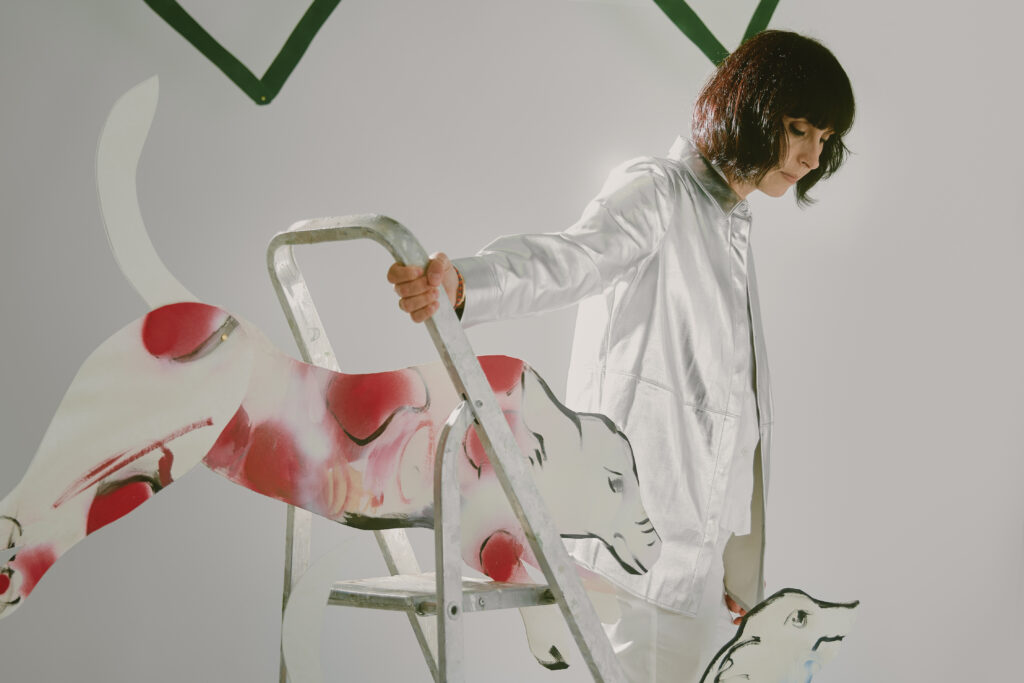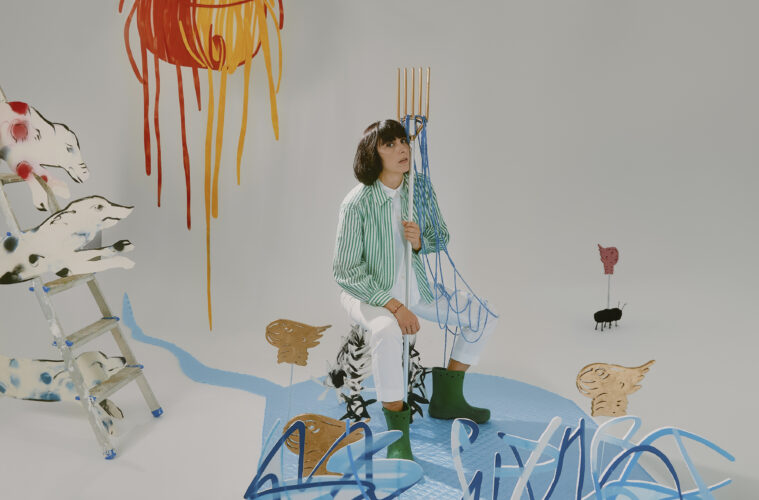We had the pleasure of sitting down with Greek artist Σtella ahead of the release of her highly anticipated new album, Adagio, out on April 4th.
Since her debut in 2014, Σtella’s music has evolved from psychedelic disco to dreamy, escapist melodies, all while staying deeply connected to her Greek roots. In this interview, we explore what it means to be an artist in today’s Greece, the nuances of songwriting in different languages, and the balance between hustle culture and creative laziness. Dive in and discover why Σtella has captivated us, especially Lazy Zsofi and Frosso – and why we can’t stop listening.
Your first single was released more than a decade ago. What were the main topics on your mind then, vs. what draws you to making music now? How has your own music changed or matured over time?
The main topics back then involved trying to figure out who I was, how to grow, and how to stay sane. Music saved me a lot around that time because it’s always easier to sing about your problems than to talk about them. I guess I’ve made some progress, I am definitely not the same person I was 10 years ago, and much of what I was dreaming of back then is now a reality.
I’ve experimented with various styles, and have collaborated with a number of musicians. I wouldn’t describe my journey as one of “maturity.” I see it less as a straightforward progression and more as a dynamic experience. It’s a space where I can navigate both forward and backward, discovering different bits and parts every time.
Lazy Women often explores how our own personal experiences, particularly as women, intersect with universal problems and structural issues. Does this idea resonate with you in your work as a musician?
I believe there are—still— many challenges for female musicians who want to pursue a career in music. The music industry—besides being one of the hardest industries out there—is not particularly easy or rewarding to women, as it should. It’s still an industry that is mostly shaped and framed by men. Throughout my own journey in this field, I’ve faced numerous challenges as a woman, yet each experience has taught me valuable lessons, allowing me to emerge stronger and wiser.
Are you a “lazy woman”? For us, the term challenges traditional notions of productivity and hustle culture—what does this idea of “laziness” evoke for you?
When I was about 25 years old, I wrote a few words in Greek on a Post-it note, and hung it up on my wall. That post-it stayed on that wall for many years.
The note said: “Μπορείς να μην κάνεις τίποτα, και θα γίνουν διάφορα,” which translates to: “You can do nothing, and things will still happen.” I’m not sure what exactly I meant to say back then or why I wrote it at the time, but to me, there is no wasted time. Even when you’re doing nothing, you’re doing something.
Who are some of your key musical influences?
Queen, The Doors, Fleetwood Mac, Michael Jackson, George Michael, Kate Bush, Annie Lennox, Nikos Gounaris, The Dixie Cups, Bithikotsis, Jenny Vanou, Nirvana, Sade.
What’s it like being an artist in Greece?
The first word that comes to mind is “challenging”. It’s ironic, considering Greece is home to the birthplace of arts and culture. However, in today’s landscape, those in power appear to lack interest in promoting or supporting art and culture. As a young artist in Greece, it can be incredibly difficult. There’s little substantial support, and it often feels like you must navigate your own path and create opportunities for yourself.
What’s your relationship to writing and singing songs in English vs. Greek? How does the language influence the sound of your music?
Singing in Greek feels more intimate, as the words carry a different meaning and weight for me. Compared to singing in English, I find it more challenging. English tends to sound lighter, perhaps because my connection to the words is less personal. This distance provides a sense of ease that makes expressing myself in English feel more comfortable.

Credits: Dimitra Tzanou
Greece has a rich and complex musical heritage, but it can also carry a certain heaviness, reflecting centuries of history and conflict. How do you balance honouring that heritage with creating something that feels fresh, like the more eerie sound of Greek New Wave?
It’s interesting that you used the word “heaviness” in your question, as I also referred to it in my previous response. Greece has endured many wars, hunger, and suffering, which has profoundly influenced its music. The music created during those tumultuous periods, particularly from the early 20th century to the 50s and 60s, carries an incredible strength. When I listen to it, it feels as if a mountain has passed over me—not in a crushing way, but in a powerful and uplifting sense. This music, along with influences from artists like Queen, Kate Bush, and Sade, has deeply inspired me and provided a sense of balance in my own creative journey.
Language has its limits—some feelings or phrases can’t fully translate from one language to another. For example, your recent song “Omorfo Mou” captures something uniquely Greek. How do you navigate these untranslatable emotions or ideas in your music?
“Omorfo Mou” is the second song in Greek I’ve ever written! The first one I wrote when I was 16 and I thought it was so cheesy that I’ve not really played it since then.
While language can be limiting, it’s fascinating how sometimes you don’t need words to convey emotion. Music has the power to evoke feelings even when the words are absent or fall short.
What’s your songwriting process like?
I don’t really have a particular writing process. Usually writing a song for me starts by holding an instrument, having an instrument in front of me. My inspiration comes from everyday life—interesting people, unique situations, and the world around me.
What can we expect from your upcoming album Adagio? What are its main themes and sounds? In what ways is it a continuation or a breakaway from the sounds of your previous album?
I’m always saying that I wrote this album to soothe people.
There are lots of nylon guitars, light percussion, kanun, and glockenspiel– all sounds that I find particularly soothing. I wouldn’t say this album is a continuation or breakaway from my previous album. It’s different because the elements are different, and truthfully, I feel all my albums are different from one another.
Σtella’s new album Adagio is out on 4 April. Written and recorded over the span of five years wih a consortium of international collaborators, including !!!’s Rafael Cohen and British songwriter Gabriel Stebbing, Adagio is a 27-minute meditation on love and desire, rest, and time. The album was produced by Σtella and mixed by Edmund Irwin-Singer.
Catch Σtella on her upcoming European tour:
7 April – Berlin, DE – Buy ticket
8 April – Amsterdam, NL – sold out
9 April – Paris, FR – sold out
10 April – London, UK – sold out
11 April – Brussels, BE – Buy ticket
12 April – Freiburg, DE – Buy ticket
14 April – Bern, CH – Buy ticket
15 April – Winterthur, CH – Buy ticket
16 April – Stuttgart, DE – Buy ticket
17 April – Heidelberg, DE – Buy ticket
18 April – Rotterdam, NL – Buy ticket
14 October – London, UK – Buy ticket
Interview by Zsofi and Frosso.
Photo credits: Dimitra Tzanou

